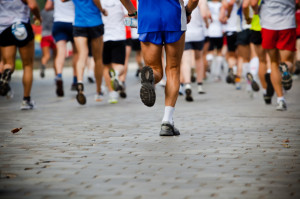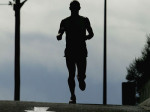-
Protein provides the building blocks of amino acids to allow for muscle mass and tissue repair, but it is the carbs that fuel this body building process. Encouraging people to control,not cut, their carbohydrate can be a challenge. Read more »
-
Exercise and age are both stressors on the body, but with the correct diet and exercise we can adapt, remodel our body and maintain a high level of fitness (at any age) if we are prepared to put in the effort, long-term. Read more »
-
At a time when they are also growing, young athletes may need as much as 50% more protein than their more sedentary peers. So should this extra protein be consumed from whole foods or supplements? Learn more...
Read more »
-
It's finally out Lea's latest sports nutrition book for children How to Grow an Athlete: From Playground to Podium is available to buy from NZ booksellers and directly from Lea. To learn more listen to Lea's interview with RNZ Read more »
-
Whether you are an athlete wanting to improve your performance or just keen to improve your level of fitness, interest is growing in the use of milk as a sports supplement that is good for your health at any age. Read more »
-
Are you needing to lose or gain weight, control blood pressure, reduce insulin resistance, diabetes, PCOS or heart disease? Dietitians recommend that controlling rather than cutting your carbos, can provide many health benefits. Read more »
-
How do you learn & where does your nutrition information come from? How much do you eat to stay well & to fund changes in activity levels? What beliefs & attitudes prevent you from making better food choices? Learn more Read more »
-
Energy deficiency is more common than you may think and can be found in our hospitals, schools and kindergartens, rest homes and on our sports fields. It can affect over and underweight people. Are you at risk? Read more »
-
Athletes over 35 years old are mostly in the Master's category. Their energy and nutrient needs change with age and the level and type of sport being undertaken. Refreshing their nutritional knowledge can improve performance Read more »
-
Recent research has highlighted the importance of vitamin D to respiratory health with those who are deficient being 5 times more likely to contract Covid-19. It is important for children, athletes and the elderly. Find out why? Read more »
-
Good vision is essential for good health and sporting performance, especially if athletes are involved in precision sports that require good hand and eye co-ordination such as tennis, archery, pistol shooting, cricket and golf. Read more »
-
Unlike a broken leg, mental health illness is something we can not see. Even athletes may discount their fatigue or depression as just due to training. Find out how to help. Read more »
-
Retirement from sport can happen at any age, in any code and any level of expertise. For many athletes it can mark an important transition in life and lead to better nutrition. Read more »
-
Are you getting enough sleep? Studies have shown that a chronic lack of sleep can have a major impact on our nutritional well- being, our mental and physical health. Read more »
-
New Zealand ranks 13th in the world for coffee consumption ahead of Australia and USA. What are the effects of caffeine on our health and can it improve our performance? Read more »
-
If we are to adopt a more plant based diet how will athletes meet their nutritional needs for protein, energy and vital nutrients? Here we offer some 6 tips on how to increase vegetable intake for better performance. Read more »
-
For many people strength and conditioning is their passport to better looks, confidence and performance. What are the nutritional issues? Read more »
-
Iron is important for happiness because without it our moods change and physical performance deteriorates. Are you getting enough?
Read more »
-
When used responsibly alcohol can help to relieve tensions in athletes and to build feelings of inclusiveness in a team. However in excess it can slowly unravel training, health and sporting careers. Read more »
-
To 'grow' a healthy athlete it takes a combination of genetics, training, hard work, good coaching, time and most of all the 'right' food. Read on and learn how. Read more »
-
Obesity is a global problem we need fresh ideas to help to solve. UK studies of icon labelling suggest this could be a popular initiative Read more »
-
If playing sport or exercising, understanding the GI can help you to select foods that will provide optimal energy at key stages of activity for better performance.
Read more »
-
An Orthorexics daily obsession with obtaining healthy eating can reduce time available for other interests that formerly made up the fabric of their life. Help is available. Read more »
-
As concern, regarding the sugar and energy content of carbonated drinks and fruit juice, gathers momentum many people are looking for alternative drinks to have. Read more »
-
As the popularity of gluten- free diets grow we need to question whether in fact it is a healthy option for any of us and if not how can we make it so? Read more »
-
While some supplements are well recognised as being useful to performance others can lead to positive drug testing and disqualification as well as endanger long-term health. Read more »
-
Stress fractures are not just a problem for athletes who overtrain. They can affect anybody as they also relate to lifestyle and nutrition choices. Find out if you at risk. Read more »
-
Distance running and “fun runs” (and walks) of varying length and degree of difficulty are becoming popular, attracting family and community groups; recreational and elite participants. Paying attention to sports nutrition can improve an athletes performance and enjoyment of these events Read more »
-
Taste is an important factor affecting fluid choice and level of consumption and therefore is an important consideration to overall sporting performance Read more »
-
Muesli and sports bars are designed to provide a convenient source of energy to be thrown into a lunchbox, gym bag or pocket and eaten “on the run”. However if eaten daily as a “lolly” or relied on as a meal replacement they can lead to unnecessary weight gain. If used wisely during training and competition they can provide athletes with a measured source of carbohydrate vital to performance. Read more »
-
Research does show more injuries occur in the mid-late afternoon in open country than other times of day. This is often when people become dehydrated, their muscle levels of energy (glycogen) can become depleted and blood glucose levels may be falling, all factors which lead to fatigue Read more »
-
Although athletes may benefit from an exhilarating endorphin rush on exertion that elevates their mood and suppresses feelings of pain it will not stop them from experiencing, at times, anxiety and bouts of depression just like the rest of us. Nutrition is one treatment option that can speed recovery. Read more »
-
Cold injuries and illness occur in a wide range of physical activities. An understanding of the importance of sports nutrition and planning appropriate meals and snacks can offer some protection and may also improve overall performance Read more »
-
Fat carries more energy than other macro nutrients (9kcals/37kJ/g compared to 7kcal/29kJ/g for alcohol and 4kcal/17kJ/g for protein and carbohydrate respectively). So with so much energy to offer does eating more improve performance?
Read more »
-
Despite the apparently healthier lifestyle vegetarian athletes (like anybody) can still become overweight, hungry, bloated and suffering from multiple nutrient deficiencies. Read more »
-
Do you ever suffer from” runners diarrhoea”, bouts of anxiety , fatigue, abdominal pain or gas when facing competition? Read more »
-
Whether you are swimming for fun or competition this sport has many health benefits that can be enhanced with good nutrition. Knowing what to eat and when can also greatly improve your enjoyment of the sport as well as your level of performance.
Read more »
-
The stress of competition, the sun and wind, sweat, chaffing and high sugar levels are just some of the things that can aggravate the skin conditions of athletes and very active people. Read more »
-
An eating disorder can affect anyone at any age, any sport, any background and any gender. The symptoms may build slowly well before the illness becomes evident. Often it is an athletes support team such as parents, friends, team mates and coaches that pick up on the symptoms and can prevent the disorder from ruining the athletes sporting career. Read more »
-
Many workers use enough energy and essential nutrients each day to power a marathon. If not replaced then a lack of these key nutrients can lead to fatigue, accidents and injury that can affect their long-term health and mobility. Read more »
-
Athletes protect your smile and your wallet as painful tooth erosion is not only expensive it can also rob your training time and performance. Read more »
-
In 2015 New Zealanders consumed a total of 518 million liters of carbonated drinks.
Outside of the drinking of milk and water there is real concern about the energy content of some of these beverages because of our rising incidence of diabetes and obesity.
Read more »
-
Nothing can be more infuriating for an athlete than after months of intense training an injury sees you ‘sidelined’. Read more »
-
Women who push the boundaries of their lives to take on new challenges and sporting events are usually also trying to juggle their work, home and training existence. With good sports nutrition advice It is possible to find renewed energy.
Read more »
-
Cycling tests an athlete’s strength and endurance capabilities as well as their anaerobic energy systems during breakaways, hill climbs and sprints to the finish.While some athletes rely heavily on dietary supplements, these will not replace a healthy training diet that is high in carbohydrate, with moderate protein and low in fat.
Read more »
-
Whether you are a novice or seasoned triathlete your nutrition plan could make or break your race. All those competing should read the excellent nutrition tips on the official Speight’s Coast to Coast website and seek professional help if they have any concerns. In addition here is a check list of things you should also consider. Read more »
-
The recent Rugby World Cup has placed the spot light on sports injuries and so we thought it might be interesting to look more closely at the protective role of sports nutrition and in particularly the nutrients important to tendon and ligament health.
Read more »
-
Are you wanting to get into exercise but are finding every excuse under the sun? E.g. my neighbour wants to join me but is away right now; I’m waiting for the gym to open; I’ll get back into it when school goes back. Does this sound familiar? If you wait for all the conditions to … Read more »
-
Young children and adolescents are not little adults – dehydration can be a real problem for young athletes. Find out why? Read more »
-
Whether you are training for a national event or simply trying to keep fit and healthy here are some tips that may help you get into gear: Read more »
-
Find out how much exercise you may need to do to burn off those extra Easter calories Read more »
-
Exercise induced asthma (EIA) occurs in approximately 90% of people with asthma.Traditionally it has been treated with medication. However, there is now convincing evidence that a variety of dietary factors can also be of help: Omega-3 polyunsaturated fatty acids in the form of fish oil Antioxidants in particular flavones which are to be found in … Read more »
-
If exercising during pregnancy, what are the risks and what forms of exercise are the safest to undertake? Read more »
-
Take up the challenge! If you want to loose weight and get fitter you have to walk more and sit less right now. It has been estimated that if everyone in the USA were to walk briskly 30mins each day they could reduce chronic illness by up to 40%. If we did the same we … Read more »
-
Young developing athletes are an incredibly challenging group to work with because they are usually in the middle of adolescence and experiencing considerable physical and emotional change. Read more »
-
If you are planning to take a team to an Olympic games or you plan to compete yourself then there are a number of issues you may like to consider in order to maximise performance and preserve good health. Read more »
-
It is possible to drink too much. Athletes in particular can be at risk of developing hypernatraemia so are advised to check their hydration plans with us before embarking on endurance events. Read more »
-
The general population is becoming more aware of the health risks associated with an inactive lifestyle, however the major task is to find innovative approaches to encourage a more active lifestyle for everyone.
Projects like the 10,000 steps Rockhampton program may be just the thing we need!
Read more »
-
Those who enter adulthood with a good level of cardiovascular fitness have been found to be least likely to develop cardiovascular risk factors such as high blood pressure, diabetes and even metabolic syndrome later in life. Read more »
-
Ideally, experienced athletes will have started preparing months before their major event with an improvement in their baseline nutrition for body maintenance. Read more »
 Exercise is widely promoted in public health policy as being good for our mental and physical health and usually it is.
Exercise is widely promoted in public health policy as being good for our mental and physical health and usually it is.






























































Leave a Reply